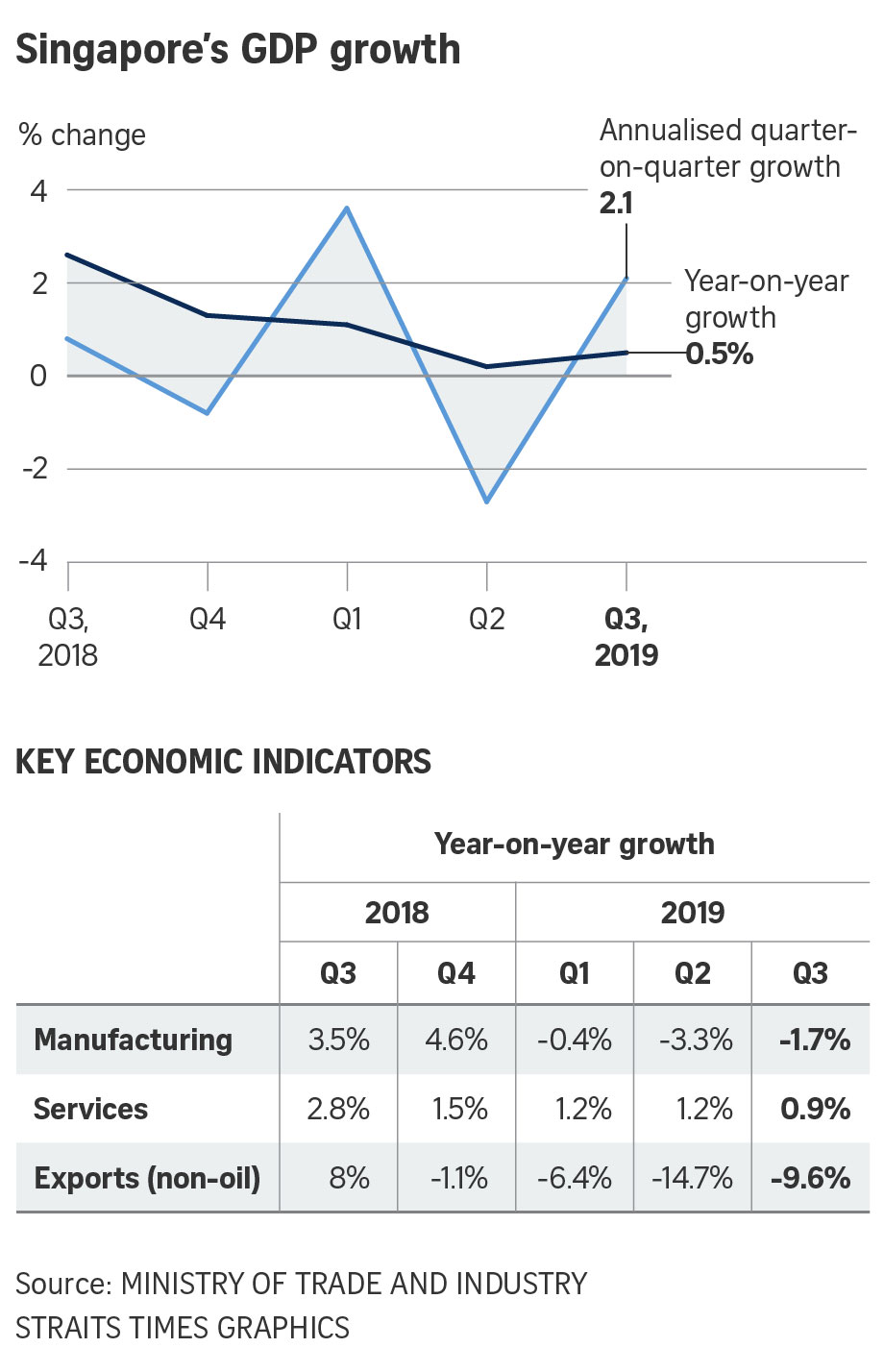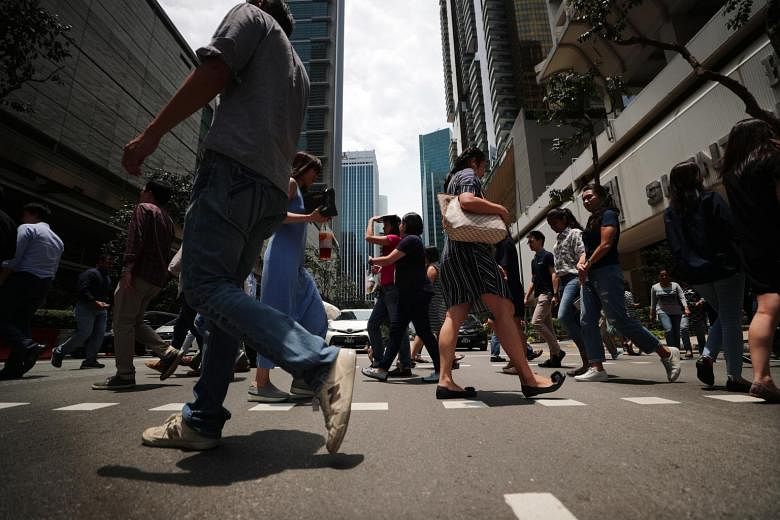SINGAPORE - The Singapore economy staged a recovery in the third quarter, growing 0.5 per cent compared with the same period last year, according to figures released by the Ministry of Trade and Industry (MTI) on Thursday (Nov 21).
This is slightly higher than the 0.2 per cent expansion in the previous quarter, revised upwards from 0.1 per cent growth.
The ministry also announced that the economy is expected to grow by 0.5 to 1 per cent this year, raising the lower end in the previous forecast range of 0 to 1 per cent growth.
This comes after an earlier official flash estimate of 0.1 per cent growth in the third quarter, pointing to the economy narrowly avoiding a technical recession. A technical recession is defined by two consecutive quarters of slowdown.
On a quarter-on-quarter and seasonally adjusted annualised basis, the economy expanded by 2.1 per cent, a reversal from the 2.7 per cent contraction in the second quarter.
The latest figures also beat the predictions of analysts polled by Bloomberg, who expected a 0.4 per cent growth year on year and a 1.8 per cent expansion over the previous quarter.
The ministry added that the economy is expected to grow by 0.5 to 2.5 per cent next year, with bright spots across sectors including a potential recovery by the manufacturing sector.
CIMB Private Banking economist Song Seng Wun said the growth in the third quarter was better than expected and going forward, the rate of contraction in the economy should narrow considerably.
"There are tentative signs of demand stabilising, but much depends on consumer and business confidence in the coming months, which (in turn) depends on jobs, investments and ultimately, on the US-China trade talks."
He added that manufacturing growth can also be supported by the demand for technology, such as in the roll-out of 5G services.
For the third quarter, the manufacturing sector shrank 1.7 per cent compared with the same period last year. But this was a moderation from the 3.3 per cent decline in the preceding quarter.

"The sector was weighed down by the electronics cluster, which contracted on the back of a decline in output in the semiconductors segment. All the other clusters in the sector expanded during the quarter, with the biomedical manufacturing cluster posting the strongest growth," MTI noted.
The wholesale and retail trade sector contracted by 3.3 per cent year on year, extending the 3.5 per cent decline in the second quarter.
MTI said: "Within the sector, the wholesale trade segment shrank primarily due to a contraction in the machinery, equipment and supplies sub-segment, which was in turn weighed down by the weak performance of our electronics exports.
"The retail trade segment also contracted on the back of declines in both motor vehicular and non-motor vehicular retail sales."
The construction sector expanded by 2.9 per cent year on year, following the 2.8 per cent expansion in the preceding quarter, supported by both public sector and private sector construction works.
The transportation and storage sector posted flat growth, slowing from the 2.4 per cent expansion in the preceding quarter.
While the air transport segment continued to clock healthy growth on account of an increase in air passenger traffic, the water transport segment contracted due to a fall in total sea cargo volume handled.
Growth in the accommodation and food services sector came in at 2 per cent year on year, faster than the 1.2 per cent recorded in the previous quarter.
MTI noted that the accommodation segment grew in tandem with an increase in international visitor arrivals, while the food services segment expanded on account of higher sales volumes at fast food outlets, restaurants and other eating places.
The information and communications sector grew by 3.4 per cent, moderating from the 4.1 per cent expansion in the previous quarter. Growth was led by the IT and information services segment, which expanded on the back of healthy demand for IT solutions.
The finance and insurance sector expanded by 4.3 per cent year on year, extending the 5.1 per cent growth in the second quarter.
"Growth was primarily driven by robust demand for payment processing services," MTI said.
Growth in the business services sector came in at 0.9 per cent year on year, slightly faster than the 0.8 per cent recorded in the preceding quarter, supported by the professional services segment.
The other services industries also posted growth, of 2.8 per cent, extending the 2.7 per cent growth in the preceding quarter. This was a result of the education, health and social services segment, which grew on the back of an expansion in healthcare facilities.
"Domestically, the manufacturing sector performed better than expected in the third quarter on the back of robust expansions in the biomedical manufacturing cluster and the aerospace segment of the transport engineering cluster, even though the electronics cluster continued to contract," said MTI.
Permanent Secretary for Trade and Industry Gabriel Lim said: "The manufacturing sector is expected to return to positive growth, led by a gradual recovery in the electronics and precision engineering clusters. This would also support growth in related sectors such as wholesale trade.
"At the same time, growth in the information and communications and finance and insurance sectors is expected to remain healthy, bolstered by firms' healthy demand for IT and digital solutions and sustained demand for payment processing services respectively."
He added that the education, health and social services segment should remain resilient as operations in healthcare facilities continue to ramp up. The construction sector is also projected to see sustained growth in the coming year.
The ministry added that global growth is projected to see a "modest pickup" next year, led by an improvement in the growth outlook for emerging market and developing economies.
MTI said: "There are signs of stabilisation in the global economy even though global growth remains weak."
However, it cautioned that growth in several of Singapore's key final demand markets such as the US and China is expected to ease.
Mr Lim said: "Investment growth (in the US) is expected to continue to slow amid prolonged trade tensions and policy uncertainty. In Asia, growth in China's economy is projected to slow in 2020 as investment growth is expected to decelerate following financial reforms to curb shadow lending. Existing US tariffs are also likely to continue to weigh on exports."
But growth in key Asean economies is expected to remain resilient, while the euro zone's growth is expected to proceed at a slightly faster pace next year with continued support from domestic demand, he added.


